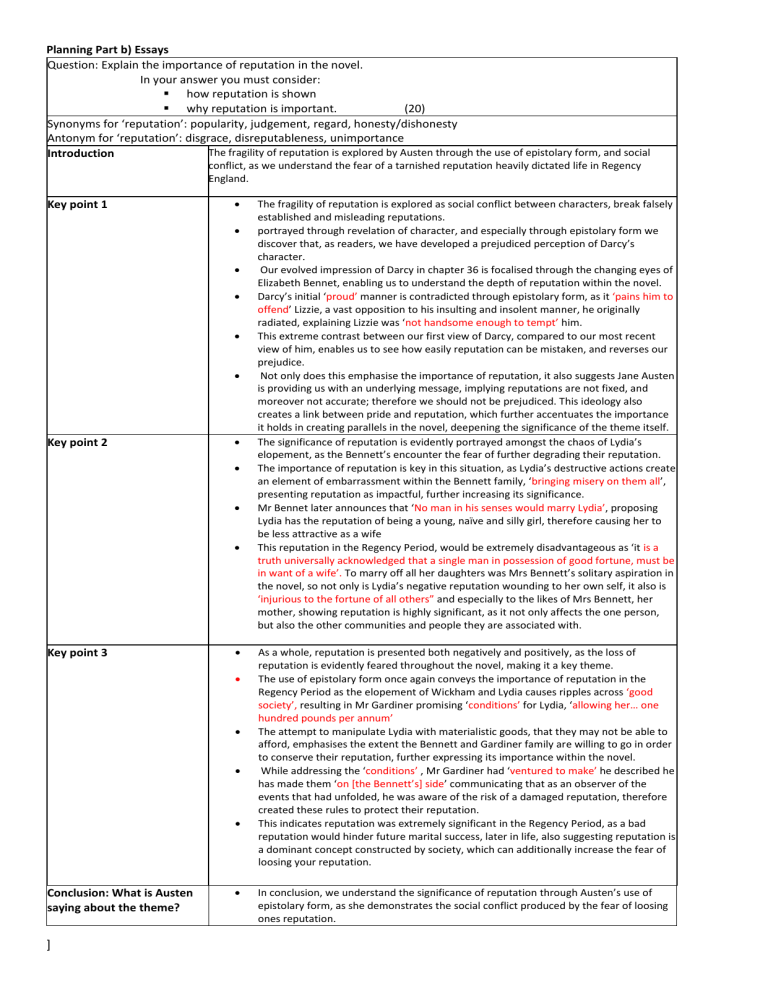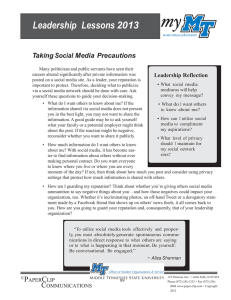
Planning Part b) Essays Question: Explain the importance of reputation in the novel. In your answer you must consider: how reputation is shown why reputation is important. (20) Synonyms for ‘reputation’: popularity, judgement, regard, honesty/dishonesty Antonym for ‘reputation’: disgrace, disreputableness, unimportance The fragility of reputation is explored by Austen through the use of epistolary form, and social Introduction conflict, as we understand the fear of a tarnished reputation heavily dictated life in Regency England. Key point 1 Key point 2 Key point 3 Conclusion: What is Austen saying about the theme? ] The fragility of reputation is explored as social conflict between characters, break falsely established and misleading reputations. portrayed through revelation of character, and especially through epistolary form we discover that, as readers, we have developed a prejudiced perception of Darcy’s character. Our evolved impression of Darcy in chapter 36 is focalised through the changing eyes of Elizabeth Bennet, enabling us to understand the depth of reputation within the novel. Darcy’s initial ‘proud’ manner is contradicted through epistolary form, as it ‘pains him to offend’ Lizzie, a vast opposition to his insulting and insolent manner, he originally radiated, explaining Lizzie was ‘not handsome enough to tempt’ him. This extreme contrast between our first view of Darcy, compared to our most recent view of him, enables us to see how easily reputation can be mistaken, and reverses our prejudice. Not only does this emphasise the importance of reputation, it also suggests Jane Austen is providing us with an underlying message, implying reputations are not fixed, and moreover not accurate; therefore we should not be prejudiced. This ideology also creates a link between pride and reputation, which further accentuates the importance it holds in creating parallels in the novel, deepening the significance of the theme itself. The significance of reputation is evidently portrayed amongst the chaos of Lydia’s elopement, as the Bennett’s encounter the fear of further degrading their reputation. The importance of reputation is key in this situation, as Lydia’s destructive actions create an element of embarrassment within the Bennett family, ‘bringing misery on them all’, presenting reputation as impactful, further increasing its significance. Mr Bennet later announces that ‘No man in his senses would marry Lydia’, proposing Lydia has the reputation of being a young, naïve and silly girl, therefore causing her to be less attractive as a wife This reputation in the Regency Period, would be extremely disadvantageous as ‘it is a truth universally acknowledged that a single man in possession of good fortune, must be in want of a wife’. To marry off all her daughters was Mrs Bennett’s solitary aspiration in the novel, so not only is Lydia’s negative reputation wounding to her own self, it also is ‘injurious to the fortune of all others” and especially to the likes of Mrs Bennett, her mother, showing reputation is highly significant, as it not only affects the one person, but also the other communities and people they are associated with. As a whole, reputation is presented both negatively and positively, as the loss of reputation is evidently feared throughout the novel, making it a key theme. The use of epistolary form once again conveys the importance of reputation in the Regency Period as the elopement of Wickham and Lydia causes ripples across ‘good society’, resulting in Mr Gardiner promising ‘conditions’ for Lydia, ‘allowing her… one hundred pounds per annum’ The attempt to manipulate Lydia with materialistic goods, that they may not be able to afford, emphasises the extent the Bennett and Gardiner family are willing to go in order to conserve their reputation, further expressing its importance within the novel. While addressing the ‘conditions’ , Mr Gardiner had ‘ventured to make’ he described he has made them ‘on [the Bennett’s] side’ communicating that as an observer of the events that had unfolded, he was aware of the risk of a damaged reputation, therefore created these rules to protect their reputation. This indicates reputation was extremely significant in the Regency Period, as a bad reputation would hinder future marital success, later in life, also suggesting reputation is a dominant concept constructed by society, which can additionally increase the fear of loosing your reputation. In conclusion, we understand the significance of reputation through Austen’s use of epistolary form, as she demonstrates the social conflict produced by the fear of loosing ones reputation. ]




